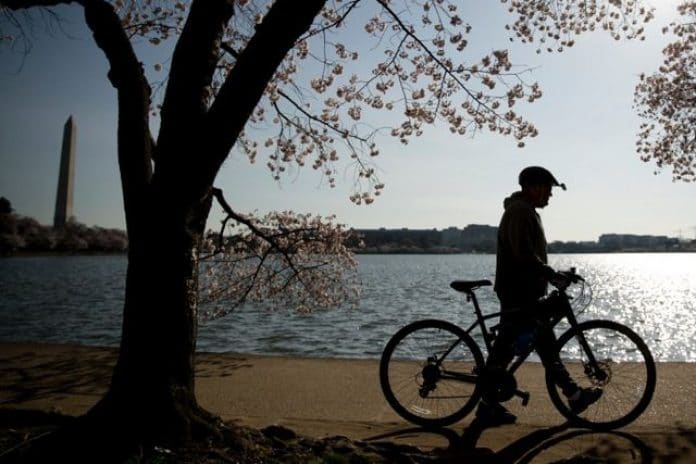Night had fallen but the sky, more muted in tonal grays than black, still had the shimmer of the March full moon and all was quiet and blank except for the rhythmic blinking of the red light on the back of a bicycle as it circled the park: on, off … on, off … on, off – a red dot tracking the exact cadence of the cyclist’s pedaling, breathing, almost audible in its persistence. Beep-pause, beep-pause, beep-pause.
Nowhere else did anything move or glow.
I stood frozen in the park with Nelly, my golden retriever, and took deep breaths of the night air, chilly and refreshing, without the worry of someone else breathing six feet away.
Close your eyes and imagine an eerie and scary, life-out-of-control scene from a flickering TV screen: The Twilight Zone, Revolution, or even The Handmaid’s Tale.
Life as we knew it just 30 days ago – no, make that 15 days … all right, life as we knew it yesterday – has been snatched from us, as stunningly and suddenly as if a cunning burglar had robbed us as we slept.
The streets and sidewalks near my home normally bustle and heave with the sighs and smiles of walkers, joggers, cyclists and neighbors walking their dogs. They all have vanished. Fewer cars drive by the house. The lights are still on but no one is really home.
A golden retriever is an affection magnet but now if I see someone approaching as I walk my dog, I pray they will not want to stop to pet her. I hold my breath as we pass.
Even though there are Luddites still laughing about the “coronavirus threat,” some blaming the crisis on the media and specifically The New York Times, this is real. This is horrific. Businesses will close. People will lose jobs; some will never get them back.
There are estimates that up to 200,000 people in the U.S. could die from this virus. I have a friend who makes a living gambling and playing the odds. He is damn good at it. He has calculated that up to 1,000,000 – one million! – could die based on algorithms he has run. Who needs science when you have the gambler’s gut?
What we can hope for is this: It’s a wake-up call, not “good night.”
Can you believe that in addition to toilet paper and bottled water stores are now running out of guns and ammunition because our citizens fear their neighbors might invade their home for a loaf of bread? Here, take my last roll of paper towels!
Make no mistake about it. Our government failed us in the first days of the coronavirus pandemic. We could have learned from China and been more prepared. We had over a month to get ready. But, no. Our president had a strong “intuition” that the virus was not a serious threat. He was worried only about the stock market, which he has often claimed as the hallmark of his presidency. He insisted the earthquake on Wall Street was being caused by alarmists in the media, not a disease that was about to strangle the world’s economy and health care systems.
By the time the president and others in positions of leadership accepted the magnitude of the menace, it was upon us and all efforts to repel it were too little, too late.
The truth is, we should have acted decades ago to build health care systems and government infrastructures that could deal with a major pandemic. Hopefully, we will get a second chance.
In Washington and around the country, too many politicians played politics – what else? – as the crisis picked up speed, and even when the need for drastic action became imperative they found it difficult to pierce the gridlock that defines their approach to governance.
But then, with President Donald Trump leading the way by changing his tone from one of seeming indifference to a forceful but calm sense of urgency, the nation’s leaders began pushing measures to forestall the spread of the virus and address the economic devastation it is causing. Texas Gov. Greg Abbott, who, like Trump, seemed too sanguine about the threat early on, also stepped up to the challenge, declaring a state of disaster and asking the Small Business Administration for an Economic Disaster Declaration that would allow businesses in the state to seek help from the SBA’s Economic Injury Disaster Loan program, which can provide long-term, low-interest loans to qualifying businesses.
There is much more the government can do: provide loss of business insurance; replace lost wages; invest in a health care infrastructure that can handle a pandemic. Trump said Washington would “go big” in dealing with the crisis. That was good news and it gave the country hope.
Meanwhile, as we try to adjust to a growing social and economic lockdown, we wash our hands until they are raw, hold our breath in the company of friends and neighbors, bump each other’s elbows as if we had just scored an NFL touchdown. We take our temperatures, worry about elderly relatives isolated in assisted living facilities we cannot visit – worry, in fact, about everything. Worry and live in fear.
And while we worry, the red light on the back of the bicycle flashes, on and off, on and off, on and off, round and round the park as the viral sword of Damocles hovers, ready to smite us one by one.
Richard Connor is president and publisher of the Fort Worth Business Press. Contact him at rconnor@bizpress.net






